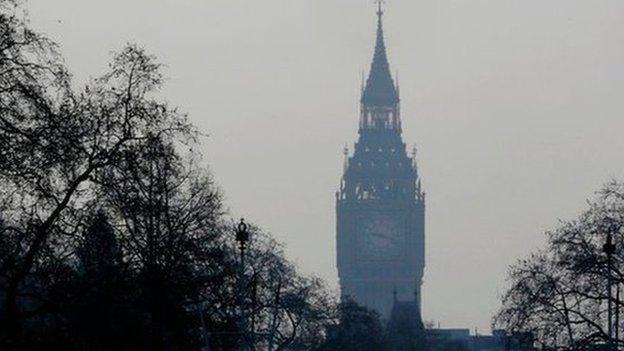Air pollution 'neglected for road safety', researchers claim
- Published
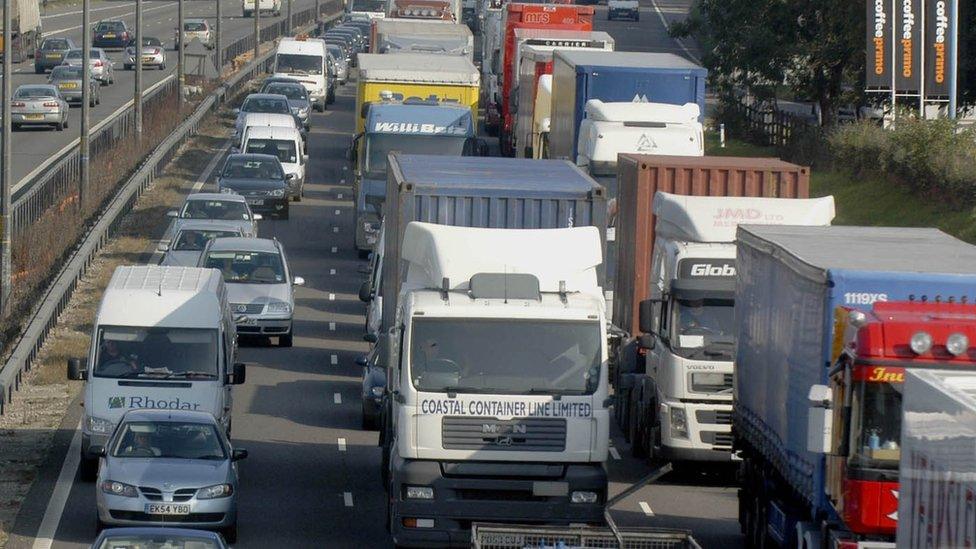
Air pollution in UK cities has failed to improve because politicians prioritise road safety and economic growth instead, research suggests.
The research, to be presented to the Royal Geographical Society, says the issue of traffic pollution falls between the transport and environment departments, but is neglected by both.
It says ministers place cars at the centre of national transport policy.
The government said it is committed to improving the UK's air quality.
The research is being presented at the Royal Geographical Society annual conference, which begins on Tuesday.
The authors, from the University of the West of England, say cars, buses and lorries are the main cause of air pollution in 95% of those cities in the UK where the air is classed unfit to breathe.
That pollution is estimated to shorten the lives of more than 50,000 people a year.
This is far higher than the number of deaths caused by traffic accidents (1,713 in 2013) - yet road safety is a much higher priority for planners than pollution, the researchers say.
'Planning failure'
The report's authors, Dr Tim Chatterton and Prof Graham Parkhurst, say this has strong implications for social equity because households in poorer areas tend to suffer more air pollution, while contributing less to the problem, because they are less likely to drive.
Prof Parkhurst said: "Air pollution is the grossest manifestation of a failure of UK transport planning to take the environmental impacts of transport choices sufficiently into account.
"Currently, air pollution is a shared priority between Defra and the Department for Transport, but shared priority does not mean equal priority. Transport policy and planning has instead prioritised safety and economic growth."
The authors say the existing vehicle fleet is being replaced so slowly that reduced vehicle use is the only sure way to bring about changes in pollution levels.
They say this will mean a huge push to encourage walking and cycling - measures that would also help combat obesity.
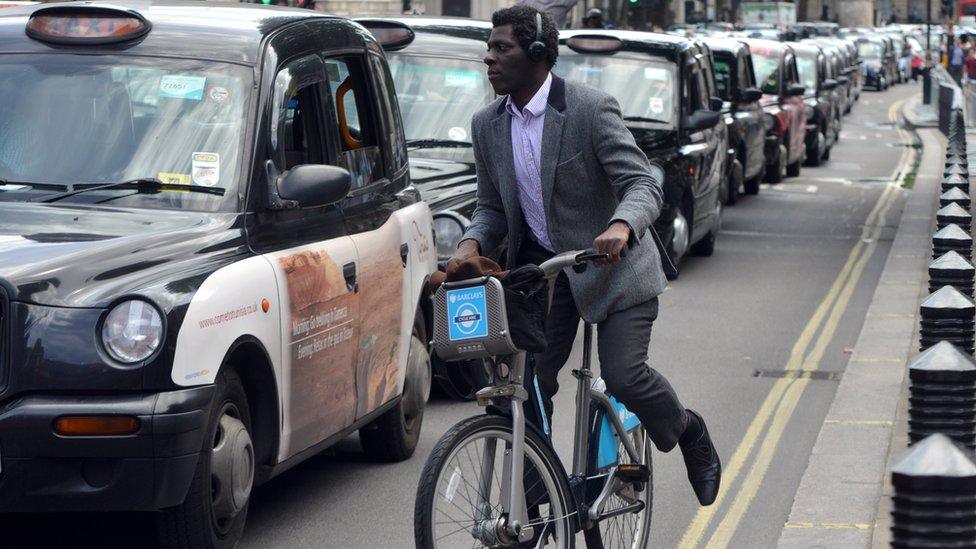
The report's authors say more people should be encouraged to cycle and walk instead of drive
Dr Chatterton said: "Air pollution-related morbidity and mortality are at epidemic levels - and, although less obvious, are more significant than road transport collisions as a cause of death and injury.
"There needs to be a strong political and societal commitment to protecting public health, particularly the health of children, whose life chances can be seriously compromised by exposure to air pollution.
"This will require not just improvements to transport infrastructure, but also changes across society in our expectations of how we, and those we connect with, get around."
The study included:
In-depth analysis of local authority approaches to managing air quality.
Evaluation of data collected by government as part of MoT tests.
Analysis of long term UK air quality data.
Analysis of studies undertaken for the Department of Transport into people's attitudes and transport choices.
Road safety groups are likely to point out that although pollution harms young people, it tends to shorten the lives of those who are already ill or elderly.
Road deaths, on the other hand, are the principal direct cause of death for young people.
AA president Edmund King told BBC News: "Road transport is essential to keep the country running whether we like it or not, as 90% of freight and 85% of passenger journeys are by road.
"The ultimate aim is to keep the country running efficiently, safely and in a more environmentally friendly manner.
"Road vehicles are getting greener, cleaner and safer and government should do what they can to give incentives to speed up this process. Saving lives in road crashes won't suggest it should."
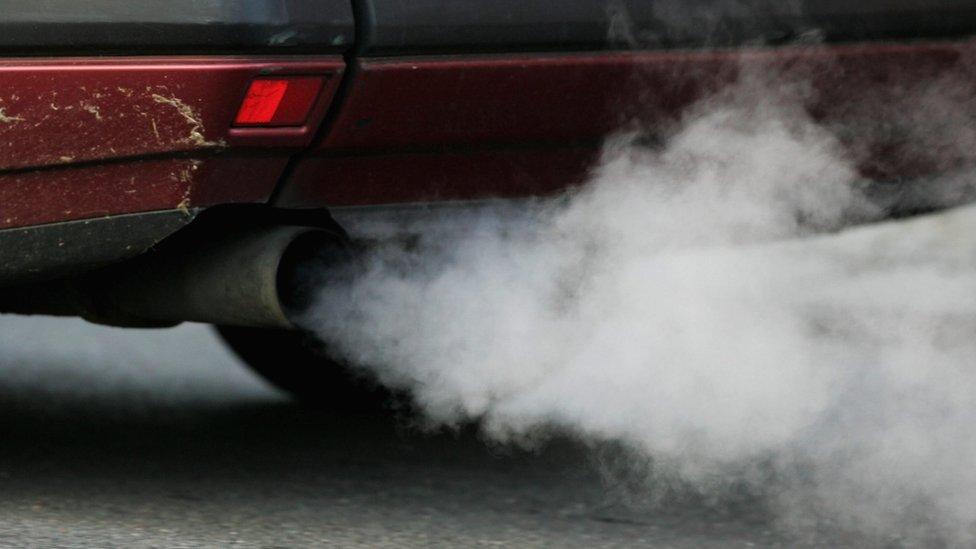
Campaigners say too much priority is given to saving car journey times
But Stephen Joseph from the Campaign for Better Transport said the research is a "wake up call" for local and Westminster politicians, as well as transport policy makers.
He said: "Transport computer models and assessments need to be reviewed too - currently they give far too much priority to small savings in journey times by car drivers, so anything that gets in the way of cars is treated as a cost.
"We see all round the country traffic planners and government agencies coming up with big road schemes, that will in practice add to air pollution rather than solving it.
"We need to change transport spending priorities to support alternatives to cars."
A government spokesman said it was "firmly committed" to improving the UK's air quality and cutting harmful emissions.
"That's why we have committed more than £2bn to greener transport schemes since 2011 and set out a national plan to tackle pollution in our towns and cities," the spokesman said.
"We have some of the safest roads in the world and are committed to making sure that record continues."
Follow Roger on Twitter @rharrabin
- Published5 August 2016
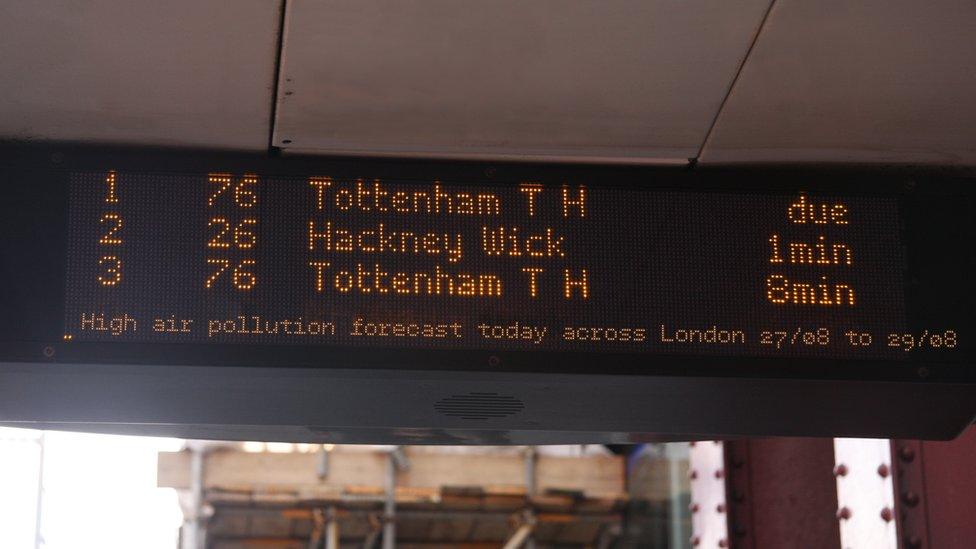
- Published2 April 2014
